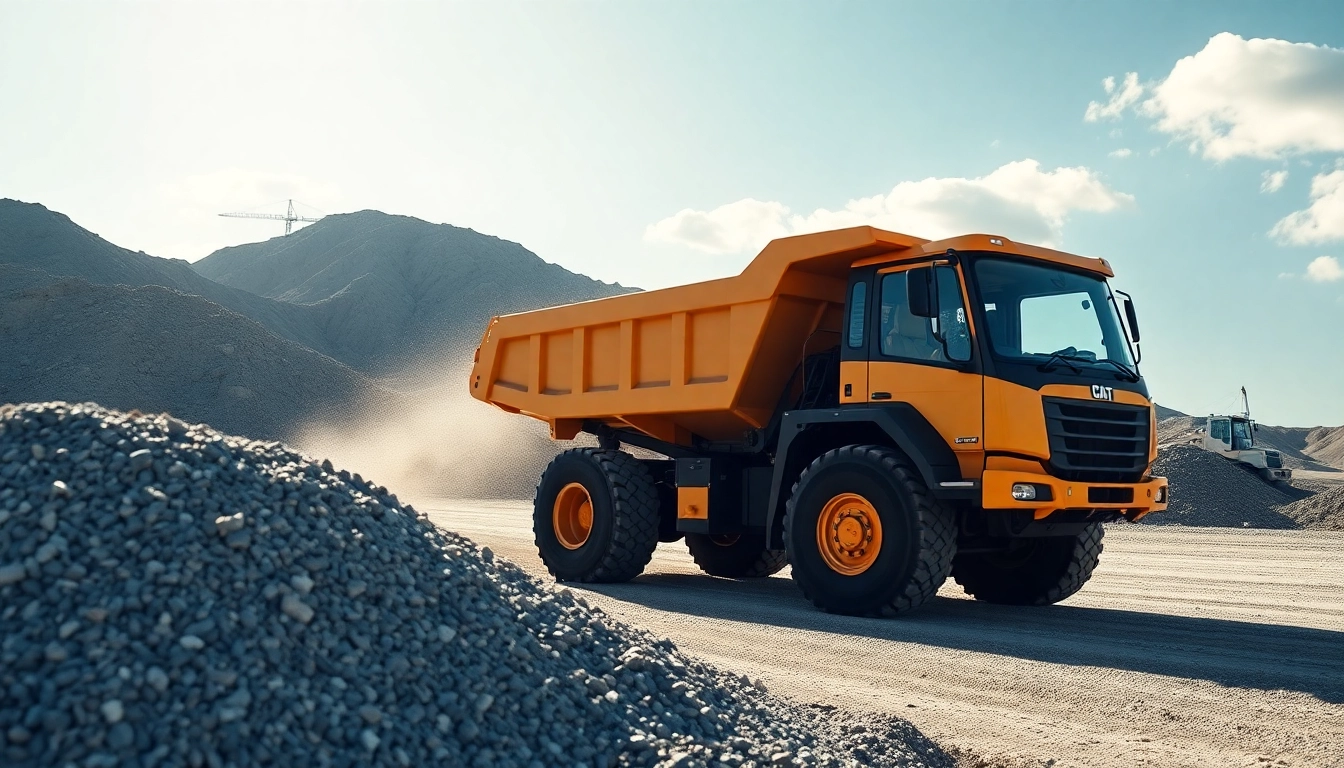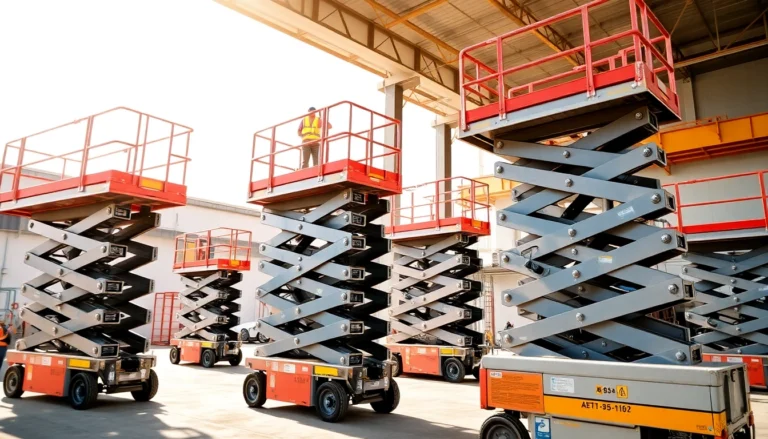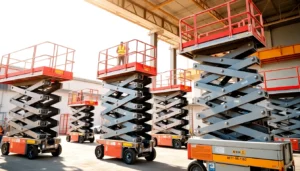Understanding Dumper Rental: Types and Uses
In the dynamic world of construction, landscaping, and urban development, efficient material transportation is crucial to project success. Among the versatile equipment options available, dumper rentals have gained prominence for their ability to handle heavy loads with minimal footprint and maximum maneuverability. Whether you’re managing a small renovation or a large-scale infrastructure project, understanding the types of dumpers, their applications, and how to select the right rental service is fundamental to optimizing productivity and safety. For those seeking a reliable solution, Dumper rental offers flexible and cost-effective options tailored to diverse project requirements.
Different Types of Dumpers Available
Mini Dumpers
Mini dumpers are compact, lightweight vehicles designed to operate in confined spaces where larger equipment cannot fit. Typically ranging from 0.25T to 1T capacity, mini dumpers excel in renovations, narrow garden projects, and indoor construction settings. They feature adjustable tipping mechanisms, making loading and unloading more efficient in tight spots. Their maneuverability enables users to access hard-to-reach areas, significantly reducing manual labor and enhancing operational safety.
Micro Dumpers
Even smaller than mini dumpers, micro dumpers are often under 1 tonne capacity, designed primarily for indoor applications, narrow pathways, or sensitive terrain. They can negotiate uneven, wet, or restricted ground conditions, thanks to their tracked or narrow wheel configurations. A notable example is the micro dumper that fits through standard doorways, facilitating interior renovation projects or urban infrastructure work without the need for extensive site preparation.
Front Tipping and Swivel Skip Dumpers
These dumpers feature versatile tipping mechanisms suitable for various terrain and load types. Front tipping dumpers are ideal for straightforward loading and unloading, suitable in open areas. Swivel skip models allow the skip to pivot, enabling material to be directed into specific locations, ideal for precise placement or working in congested environments.
High Tip and Articulated Dumpers
Designed for heavy-duty applications, high tip dumpers can elevate loads significantly higher, facilitating quick deposition into elevated dumping sites or containers. Articulated dumpers, with independent steering for front and rear axles, enable exceptional mobility on rugged terrain, making them perfect for large-scale earthmoving, mining, or construction projects spanning varied ground conditions.
Dumper Trucks
Large dumper trucks, capable of carrying multiple tonnes, are used predominantly in large-scale infrastructure or quarry operations. They are designed for optimum efficiency in moving vast quantities of material over extended distances on rough terrains, often equipped with advanced hydraulics and safety features.
Applications in Construction and Landscaping
Construction Industry
The construction sector relies heavily on dumpers to streamline the transportation of aggregate, soil, debris, and construction materials. From urban developments to infrastructure upgrades, dumper rentals facilitate quicker site clearance, foundation work, and material delivery, minimizing manual labor and reducing project timelines. Their adaptability to different ground conditions and capacities makes them essential for efficient workflow management.
Landscaping Projects
In landscaping, precision and mobility are vital. Mini and micro dumpers are frequently employed to transport soil, gravel, mulch, or plant materials across gardens and parks. Their ability to operate in confined residential backyards, urban parks, and narrow pathways enables landscapers to execute complex designs with reduced disruption and increased safety.
Urban and Rural Development
Both rural and urban development projects leverage dumpers for earthmoving, road construction, and site preparation. Micro dumpers can easily navigate tight city streets, while larger models expedite large-scale earthworks in rural areas. Their role is fundamental in infrastructure expansion, environmental remediation, and emergency repairs, especially where access is limited or ground conditions are challenging.
Choosing the Right Dumper for Your Project
Assessing Project Requirements
Successful dumper selection begins with a thorough assessment of your project’s specific needs. Consider load capacity, ground conditions, space constraints, and the type of materials to be transported. For indoor or narrow space projects, mini or micro dumpers are preferable, whereas large excavations may require articulated or truck dumpers. Precision in this phase reduces equipment misuse, increases productivity, and maintains safety standards.
Matching Equipment Specifications to Job Scale
Small-scale projects demand compact equipment, while larger operations benefit from high-capacity models with advanced features. For instance, a 0.25T mini dumper might suffice for a backyard landscaping project, but a 3T articulated dumper is suitable for extensive earthworks. Evaluate the workload, site space, and material type to strike the right balance between capacity and accessibility.
Considering Terrain and Ground Conditions
Different dumpers are optimized for particular terrain conditions. Tracked micro dumpers excel on uneven, muddy, or delicate grounds, minimizing ground disturbance. Articulated dumpers provide stability and traction on rough, hilly terrains. Selecting equipment with appropriate ground contact and maneuverability features ensures safety and operational efficiency.
Key Factors in Selecting a Dumper Rental Service
Equipment Quality and Maintenance
Reliable rental providers prioritize well-maintained machinery, reducing downtime and repair costs. Regular servicing, thorough inspections, and certifications ensure that dumpers meet safety standards. A trusted rental company offers equipment that is clean, functional, and tested before delivery, ensuring your project runs smoothly without unexpected interruptions.
Pricing and Rental Terms
Transparent pricing, flexible rental durations, and clear terms define a quality service. Compare daily, weekly, or long-term rates across providers to optimize costs. Some companies offer packages inclusive of delivery, operator training, and maintenance support, providing greater value in the long run.
Customer Support and Delivery Options
Prompt delivery, flexible scheduling, and responsive customer support are crucial when coordinating equipment logistics. A knowledgeable rental provider can advise on suitable equipment, assist with site planning, and offer emergency support if needed. Ensuring local availability minimizes delays and enables swift project commencement.
Best Practices for Operating Dumpers Safely
Pre-Operation Checks and Safety Gear
Before use, operators should conduct thorough inspections: checking for leaks, hydraulic functions, warning signals, and tire or track condition. Personal protective equipment such as helmets, high-visibility vests, gloves, and sturdy footwear should always be worn to mitigate risk during operation.
Handling Load Capacity and Ground Conditions
Overloading can compromise stability, cause mechanical failure, or lead to accidents. Adhere strictly to manufacturer load limits and consider the effect of ground conditions on traction and tipping. Soft, wet, or uneven surfaces require reduced speeds and modified handling techniques to prevent tipping or getting stuck.
Operator Training and Compliance
Proper training on dumper controls, safety protocols, and emergency procedures is essential. Operators should be certified and familiar with site-specific hazards. Compliance with health and safety regulations, including manufacturer guidelines, reduces liability and promotes a safety-first work environment.
Cost Optimization and Rental Tips
Comparing Rental Prices Across Providers
Market research reveals substantial price variations; hence, obtaining quotes from multiple vendors ensures competitive rates. Consider all included services—delivery, operation, maintenance, and fuel—to evaluate true cost differences. Negotiating long-term agreements or bulk rentals can unlock further discounts.
Long-Term vs Short-Term Rental Benefits
For ongoing projects, long-term rentals often provide cost savings, priority support, and dedicated equipment management. Short-term rentals are suitable for one-off tasks, offering flexibility without commitment. Evaluate project duration, budget constraints, and operational needs to choose optimum rental models.
Maximizing Equipment Productivity
Effective site planning, regular maintenance, and skilled operation enhance dumper efficiency. Scheduling usage during optimal times reduces downtime. Proper loading techniques, understanding terrain challenges, and adhering to safety practices also improve overall output, leading to cost savings and faster project completion.
Customer Success Stories and Industry Applications
Case Studies of Effective Dumper Rentals
An urban regeneration project in Birmingham utilized micro dumpers to navigate narrow city streets, completing groundwork 30% faster than traditional methods. The availability of tailored equipment and expert support minimized site disruptions, demonstrating the value of specialized dumper rentals.
Innovative Uses in Urban and Rural Projects
In rural road improvement projects, articulated dumpers efficiently transported large volumes of aggregate over rough terrains, reducing project duration. Conversely, indoor renovations employed petrol-powered mini dumpers to maneuver in confined spaces without disturbing existing structures, exemplifying versatility.
Future Trends in Dumper Rental Technology
Emerging innovations include electric dumpers for eco-friendly operations, telematics for fleet management, and autonomous models enhancing safety and efficiency. Industry leaders are investing in smarter, sustainable equipment, promising even greater ROI for rental customers in the coming years.







